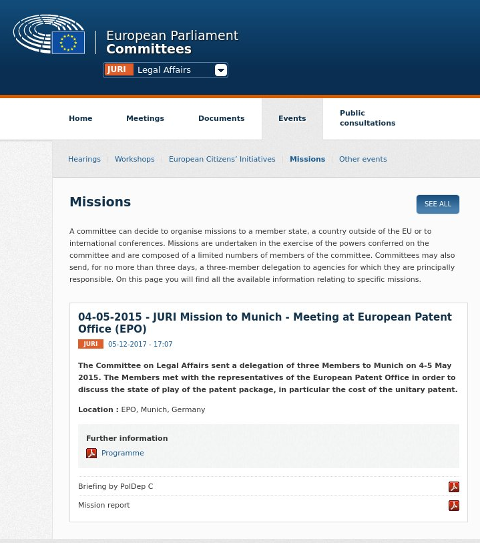
[PDF] | Original [PDF]
[PDF] | Original [PDF]
[PDF] | Original [PDF]

THE European Patent Office (EPO) has not formally spoken about the death of the UPC. Instead, Battistelli's "little helper" -- another liar -- did so in interviews with the media and UPC lobbying outlets. He decided to travel to London to tell a bunch of lies following the UK's formal refusal to participate (which in turn means that the UPC/A and the British ratification become moot). Battistelli's UPC hopes are now dead.
"Battistelli's UPC hopes are now dead."JURI (or the JURI Committee) says it quite clearly. It's not too hard to grasp. It's not the first time JURI speaks about the subject, but highlighted below are key arguments:
Despite positivity from the EPO and UPC preparatory committee on the speed with which the Unitary Patent package (the Unified Patent Court and unitary patent system) can be implemented once a favourable decision is given by the German courts on the constitutional complaint, there remains much to do to get the UPC started, not least a decision on whether the UK can remain part of the system post-transition.
The "EU Patent and Brexit" report commissioned by the European Parliament reviews the positions of the UK Government, the European Parliament, the CJEU and the European Council on options for the UPC at the end of the Brexit transition period and whether the UK can remain a member - in the process revealing that there is still much to resolve.
[...]
The optimism of a speedy implementation of the UPC does not appear to be reflected in the "EU Patent and Brexit" report requested by the JURI Committee (the European Parliament's Committee on Legal Affairs) published in November 2019. This report reviews the various options for the UPC when the UK functionally leaves the EU at the end of the Brexit transition period, and whether the UK can stay a member of the UPC by digesting the positions of the UK Government, the European Council, the European Parliament and the CJEU.
In its analysis the report finds that: "The recent ratification of the UPCA has proved that the UK intends to stay within the framework of a European Patent system that goes beyond the EPC, even after Brexit. In certain ways this sends a somewhat mixed message, as the UK wishes to leave the Single Market of the EU and the jurisdiction of the CJEU. On the other hand, it seems not per se legally impossible that the UK can stay within the UPCA, even when not an EU Member State". However, it goes on to say that this intention of the UK is countered by the UK Government's statement that "the end of the jurisdiction of the CJEU in the UK was one of the main intentions of the whole Brexit process".
When considering the consequences of its analysis, it reaches the following conclusions:
First, that "[m]aintaining the UK within the UPCA would need innovative legal solutions, as the UPC is an international court applying EU law -and the reason for Brexit was all about not applying EU law any more. All EU actors are of the opinion that the CJEU would have the final say about interpretation of existing EU Law, that the primacy of EU law has to be respected and that the CJEU is the ultimate guardian of EU intellectual property law. On the other hand, the jurisprudence of the CJEU is not expressly excluding the possibility to allow a non-EU Member State forming part of the UPCA".
Secondly that "As any UPCA contracting state has the right to nominate judges, any British judge would decide about the interpretation and application of EU (patent) law. It would be only logical that the UK authorities accept the primacy of EU law when it comes to judgements which have been issued by UPC sections with the participation of UK judges, especially from the London specialised section".
It seems that the issues raised in the report need to be dealt with before implementation can occur.
Interestingly, the report also suggests that to move the London Section of the UPC's Central Division somewhere else would, in the European Council's opinion, not be a purely administrative decision (as was the case with moving the European Medicines Agency), but would require the unanimous amendment of the UPC Agreement and thus the agreement of all signatories including the UK.